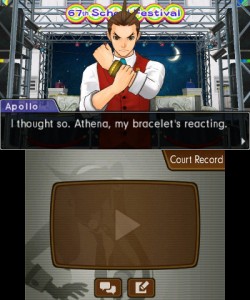Phoenix Wright: Ace Attorney – Dual Destinies Review (3DS)
- Updated: 24th Oct, 2013

As well as having a ridiculously long name, Phoenix Wright: Ace Attorney: Dual Destinies has a long heritage to follow. As the fifth Ace Attorney game coming over 10 years after the original GBA game, the new game has a huge set of expectations. Can it possibly please everyone?
Throughout Dual Destinies you’ll investigate and try court cases as three defence attorneys from the Wright Anything Agency: Phoenix Wright, the agency’s owner; Apollo Justice, Phoenix’s junior who featured in his own Ace Attorney game; and their newest employee Athena Cykes.
Gameplay Changes
Each protagonist has their own special investigation power. Phoenix has his “magatama”, a pendant that allows him to see “Psyche-Locks” that indicate when a witness is hiding a serious lie in their testimony. Apollo wears a bracelet that pulses when a witness is lying and allows him to spot minuscule movements that betray the false testimony. Athena’s power lies in something called “analytical psychology”, based on a computer around her neck that she calls Widget. You can learn more about Athena’s special power in my preview, which also includes a demo video.
[Newbies to the series: Try not to think too hard about how these powers would be permitted in a law court. The Ace Attorney legal system is a strange one.]
In a marked change from the previous games, using these powers doesn’t earn you a penalty during the trials. You can make as many false accusations as you wish during these minigames without fear that the judge will get call the trial to a premature end. Having to suffer through the same generic failing dialogue over and over again is punishment enough. You’ll still earn penalties for wild accusations without evidence, so it’s not become a complete cakewalk.
That said, it feels like the new game has been designed for playing in smaller, easier sittings. You get frequent reminders of conversations that happened not that long ago and occasionally, when the defence team confers, someone will outright tell you what you need to do next. There are other opportunities where you are left to your own devices, but these moments do diminish the fun of working things out for yourself.
However, the previous games frequently had me shouting the correct chain of events at the screen while bring unable to figure out which bit of testimony needed which specific bit evidence to trigger the next chain of events. This is probably an improvement. The replays of previous conversations will also be a great help if you don’t play for a few days.
 As with all the Ace Attorney games, the strength of Dual Destinies lies more in the characters and story than the gameplay. These new cases never quite reach the heights of absurdity that fans saw in 2007’s Justice For All but between flying spirit demons, robotic police officers and a jailbird prosecutor, there’s plenty to look forward to.
As with all the Ace Attorney games, the strength of Dual Destinies lies more in the characters and story than the gameplay. These new cases never quite reach the heights of absurdity that fans saw in 2007’s Justice For All but between flying spirit demons, robotic police officers and a jailbird prosecutor, there’s plenty to look forward to.
Characters
Throughout Phoenix Wright: Dual Destinies, you’ll meet a host of new characters and quite a few cameos from the past. To my disappointment, the bumblingly competent Dick Gumshoe never makes an appearance. Instead, he’s replaced by a new and altogether perkier policeman, Detective Fulbright. Trucy Wright pops in for the occasional comment about her Magic Panties, which are every bit as bewildering as they sound. Rock star prosecutor Klavier Gavin returns to face off against Apollo Justice once again and the old judge is as confused as he ever was.
I’ve never been a fan of Apollo Justice and as a result, I found the middle section of the game rather dull. He just doesn’t seem to have any personality beyond his Chords of Steel. I cringe every time someone mentions them. Apparently this refers to his loud voice, but since this is the first of the Ace Attorney series to feature fully voice-acted cutscenes, it’s a largely irrelevant character trait.
The cutscenes themselves are few and far between. There are 20 in total, lasting approximately 30 seconds each and, after four games of reading these characters, it’s really quite jarring to hear Phoenix and Apollo being voiced with such godawful American accents. Progress is progress, however, and it thankfully doesn’t last long. The vast majority of the game is still text-based and easily skippable by pressing B. Should you accidentally miss a line of dialogue, there’s now a log of the most recent lines, easily accessible from the touch-screen menu.
 Dual Destinies also has the honour being the first game, film or TV show where I actively switch on the 3D function. Not for long but every gamer will appreciate how beautifully the 3D effect has been applied to the mostly-2D crime scenes.
Dual Destinies also has the honour being the first game, film or TV show where I actively switch on the 3D function. Not for long but every gamer will appreciate how beautifully the 3D effect has been applied to the mostly-2D crime scenes.
I wasn’t as entranced by Dual Destinies as I have been by the previous Ace Attorney games. While the cases were interesting, the new characters are much tamer and less quirky than before, to the point of being tiresome. That said, things picks up tremendously in the fourth and fifth cases so I’d recommend you stick it out.
Phoenix Wright: Ace Attorney: Dual Destinies is out now for 3DS from the Nintendo eShop. Those who buy it before 7th November will receive a free DLC pack containing a new costume for Phoenix, Apollo and Athena. After 7th November, this will cost 99p.
A sixth episode called Turnabout Reclaimed will also be released soon after the game launches. This is a standalone case unrelated to the events of the main game.


Follow Us!